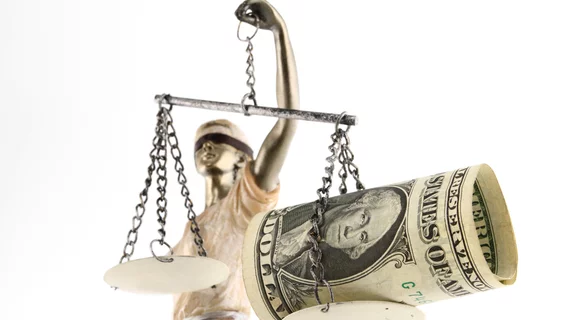Healthcare fraud: DOJ recovered $1.9B in 2023, including several key settlements related to cardiology
The U.S. Department of Justice (DOJ) reported nearly $2.7 billion in civil fraud recoveries in 2023 alone, according to a new analysis from the law firm Bass, Berry & Sims. Nearly $1.9 billion of those recoveries were related to healthcare fraud, including multiple cases that focus on cardiology, cardiac surgery and cardiac imaging.
Nashville-based Bass, Berry & Sims, recognized as one of the largest healthcare law firms in the United States, published a lengthy report highlighting the year in fraud recoveries. The full analysis can be downloaded for free here.
According to the report’s authors, qui tam lawsuits—which allow whistleblowers to sue companies on behalf of the United States and then receive a small percentage of any recovered funds—were a “driving force” behind these fraud recoveries.
“The government and whistleblowers remain keenly focused on alleged violations of the Anti-Kickback Statute and alleged violations of the False Claims Act involving managed care,” Brian D. Roark, co-chair of the Bass, Berry & Sims Healthcare Fraud and Abuse Task Force, said in a prepared statement. “Individuals and entities in the healthcare industry should expect continued focus in these areas in the coming year. Other hot-button issues likely will include the intersection of the False Claims Act with cybersecurity issues and the Controlled Substances Act, among others.”
Reviewing key cardiology-related fraud settlements from 2023
The law firm’s thorough analysis reviewed several fraud settlements that impacted the world of cardiac care in 2023. For example, one October settlement related to a complex cardiac imaging scheme was listed as the year’s largest settlement in the “Laboratory and Diagnostic Services” sector. The total payout was $85.5 million.
“The company allegedly paid cardiologists for supervising scans that were performed when the cardiologists were away from the scanning units or not even on site,” according to the Bass, Berry & Sims report.
Another imaging-related fraud scheme involved New York City cardiologist Klaus Rentrop, MD. Back in September, Rentrop agreed to pay $6.5 million and relinquish ownership of his cardiology practice, Gramercy Cardiac Diagnostic Services, for participating in a complex kickback scheme for several years. Rentrop and Gramercy Cardiac “admitted and accepted responsibility” for this conduct as part of that final settlement.
The Bass, Berry & Sims report also focused on a fraud settlement from the end of 2023 that involved a cardiac surgeon who was allegedly paid well above fair market value in exchange for making a high number of hospital referrals. Arvind Agnihotri, MD, was accused of receiving close to $5 million in incentives for participating in the alleged scheme.
In January, meanwhile, Arkansas cardiologist Jeffrey G. Tauth, MD, was at the heart of yet another settlement related to False Claims Act allegations. While there was no determination of liability, Tauth did agree to pay $900,000 to settle claims he had billed for medically unnecessary cardiac stent procedures.
For more details about the DOJ’s fraud settlements in 2023, view the full report.

